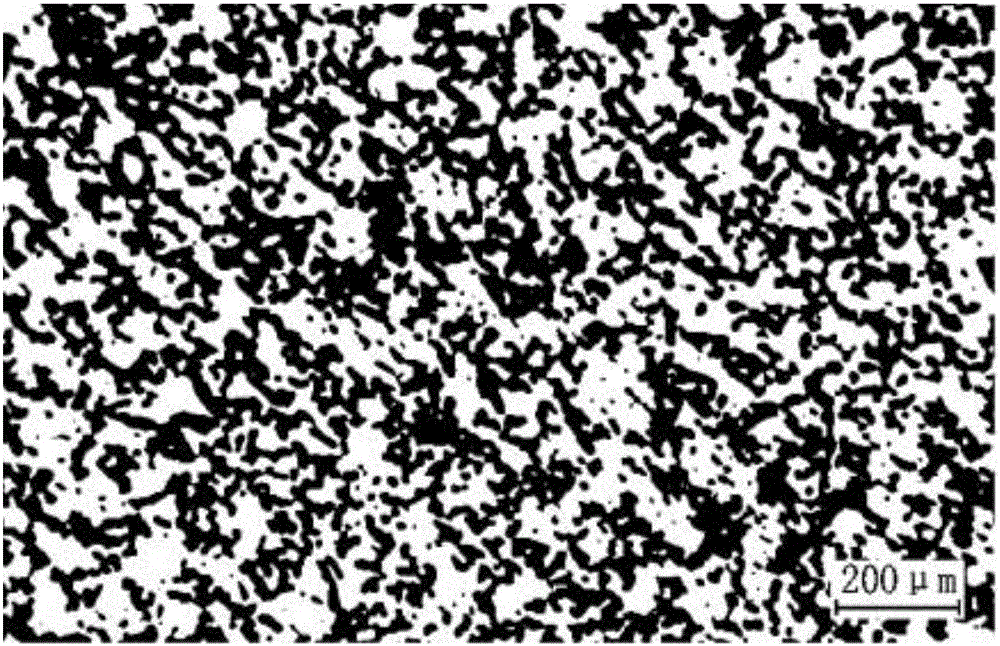Biomedical porous Ti alloy and preparation method
A biomedical and titanium alloy technology, applied in the field of biomedical porous titanium alloy and its preparation, can solve the problems of single pore size, matrix metal pollution, safety hazards, etc., and achieve the effect of low inclusion content and low elastic modulus
- Summary
- Abstract
- Description
- Claims
- Application Information
AI Technical Summary
Problems solved by technology
Method used
Image
Examples
Embodiment 1
[0042] With high purity Ti, Nb, Zr, Mo, TiH 2 and ZrH 2 The powder is used as raw material to prepare the alloy, and the weight and particle size of each component are: Ti powder 54.353g, in which the weight of Ti powder with a particle size of 20μm and 50μm is equal; Nb powder 20.000g, with a particle size of 25μm; Zr powder 4.639g, with a particle size of 10μm; Mo powder 4.000g, particle size is 10μm; TiH 2 Powder 16.306g, particle size is 10μm; ZrH 2 Powder 1.392g, of which 10μm and 20μm ZrH 2 The weight of the powder is equal; the weight percentage of each alloy element is: Nb: 20wt%; Zr: 6wt%; Mo: 4wt%, and the balance is Ti. Put the powder into a vacuum ball mill tank, mix it in a three-dimensional motion mixer for 6 hours, and then cold press the powder into a cylindrical green body in a mold with a pressure of 200MPa; put the cylindrical green body into a vacuum sintering furnace , after the cold state is evacuated, it is filled with argon gas with a purity of 99.9...
Embodiment 2
[0044] With high purity Ti, Nb, Zr, Mo, TiH 2 and ZrH 2 The powder is used as the raw material to prepare the alloy. The weight and particle size of each component are: Ti powder 43.249g, in which the weight of Ti powder with a particle size of 20μm, 50μm and 70μm is equal; Nb powder 22.000g, in which the weight of Nb powder with a particle size of 25μm and 50μm Equal; Zr powder 5.372g, particle size 15μm; Mo powder 6.000g, of which 15μm and 25μm Mo powder weights are equal; TiH 2 Powder 21.625g, particle size is 20μm; ZrH 2 The powder is 2.686g, the particle size is 15 μm, and the weight percentage of each alloy element is: Nb: 22wt%; Zr: 8wt%; Mo: 6wt%, and the balance is Ti. Put the powder into a vacuum ball mill tank and mix it in a three-dimensional motion mixer for 6.5 hours, then cold press the powder into a cylindrical green body in a mold with a pressure of 180MPa; put the cylindrical green body into a vacuum sintering furnace In the cold state, after evacuating in...
Embodiment 3
[0046] With high purity Ti, Nb, Zr, Mo, TiH 2 and ZrH 2 The powder is used as raw material to prepare the alloy, and the weight and particle size of each component are: Ti powder 48.416g, in which the weight of Ti powder with a particle size of 50μm and 70μm is equal; Nb powder 21.000g, with a particle size of 50μm; Zr powder 5.031g, with a particle size of 25μm; Mo powder 5.000g, particle size is 25μm; TiH 2 Powder 19.366g, of which 15μm and 25μm TiH 2 Powder weight is equal; ZrH 2 The powder is 2.012g, the particle size is 25 μm, and the weight percent of each alloy element is: Nb: 21wt%; Zr: 7wt%; Mo: 5wt%, and the balance is Ti. Put the powder into a vacuum ball mill tank and mix it in a three-dimensional motion mixer for 8 hours, then cold press the powder into a cylindrical green body in a mold with a pressure of 150MPa; put the cylindrical green body into a vacuum sintering furnace , after the cold state is vacuumized, it is filled with argon with a purity of 99.999...
PUM
| Property | Measurement | Unit |
|---|---|---|
| particle diameter | aaaaa | aaaaa |
| particle diameter | aaaaa | aaaaa |
| particle diameter | aaaaa | aaaaa |
Abstract
Description
Claims
Application Information
 Login to View More
Login to View More - R&D
- Intellectual Property
- Life Sciences
- Materials
- Tech Scout
- Unparalleled Data Quality
- Higher Quality Content
- 60% Fewer Hallucinations
Browse by: Latest US Patents, China's latest patents, Technical Efficacy Thesaurus, Application Domain, Technology Topic, Popular Technical Reports.
© 2025 PatSnap. All rights reserved.Legal|Privacy policy|Modern Slavery Act Transparency Statement|Sitemap|About US| Contact US: help@patsnap.com


